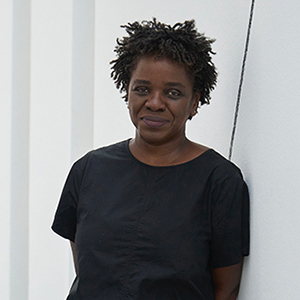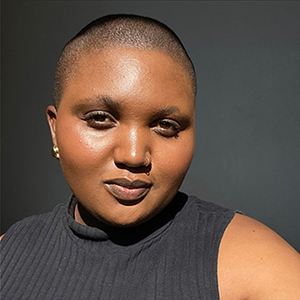College of Human Sciences
DGSS puts spotlight on anti-colonial and feminist scholarship
The Department of Gender and Sexuality Studies (DGSS) in the College of Human Sciences recently held its second Annual Public Lecture in a programme that boasted top women academics. The lecture, entitled "Unpayable debt: A feminist reading of the scene of value" was delivered by the acclaimed scholar, philosopher and artist Prof Denise Ferreira da Silva. In her welcoming address, the Executive Dean of the College of Human Sciences, Prof Zethu Nkosi, shared appreciation for DGSS for hosting the event in alignment with Women's Day and Women's Month.

Prof Denise Ferreira da Silva
She also highlighted the possibilities presented by open distance e-learning, where we can engage globally with esteemed scholars, and students can learn from academic discourse through virtual platforms. She noted that the presence of Ferreira da Silva and other programme participants indicates that "we are here to represent ourselves as Iimbokodo." She applauded the department for "upholding the college's mandate to create and deliver a social justice agenda." Nkosi also highlighted the significance of the lecture within South Africa's commitment to the United Nations' Sustainable Development Goals (SDGs), mainly number 5, which deals with gender equality and the safety of all women and girls.
The head of DGSS, Prof Itumeleng Mothoagae, said: "This year's lecture is yet another opportunity for us to contribute ideas in a global and Pan-African scholarly space and to engage in dialogue about the lived realities of black women in the global South." The lecture asked whether society and its institutions are doing enough to recognise black women's contributions at the grassroots level. Secretary General of Unisa's National Student Representative Council (NSRC), Shatadi Phoshoko, reflected poignantly on the question; she said: "The erasure of black women at the grassroots level relegates black women to footnotes or by the ways." She spoke passionately about how black women who played critical roles in liberating our country and world are obscured. "Women are briefly celebrated, and by the 31st of August, their names are muted only to be revisited next year during Women's Month," she stressed.

Prof Denise Ferreira da Silva
On Phoshoko's point, Ferreira da Silva said: "It never ceases to surprise me how similar the situation of black women in the world is – in Brazil, Canada, the United States, France, the United Kingdom and South Africa."
Da Silva's work aims to disrupt temporal and spatial logic and always returns to subjugated bodies' realities and lived experiences. Her work is nested in the ceaseless exploitation of black women's flesh and labour in the perpetuity of capitalist exploitation and extraction.
She started her lecture by using quotes by the acclaimed writer Octavia Butler (Kindred), literary critic Hortense Spillers (Mama's Baby Papa's Maybe) and abolitionist Sojourner Truth (Ain't I a Woman) to foreground her focus on what she terms the colonial racial cis-hetero-patriarchal matrix of power. "From these, I arrived at unpayable debt as a praxis, a theory, a text and a method for living," she explained.
Stating further: "Unpayable debt is also apt at spotting and restraining its inner demons in the same way it knows how much these may trouble the openings it promises."
The public lecture was also an opportunity to profile DGSS as Unisa's newest department, formerly the Institute of Gender Studies. The new department aims to consistently produce knowledge and research questions about the state of women, particularly black women and queer people across Africa and the global South.
Other speakers who contributed to the significance of the programme were top scholars such as Prof Zodwa Motsa Madikane, the Vice-Principal: Teaching, Learning, Community Engagement & Student Support; Prof Puleng Segalo, Chief Albert Luthuli Research Chair, and Dr Mahlogonolo Thobane, Senior Lecturer in the Department of Criminology and Security Studies.
Ferreira da Silva is a newly appointed Samuel Rudin Professor in the Humanities Department of Spanish and Portuguese Languages and Literatures at New York University. Before that, she was the Director of The Social Justice Institute (Institute for Gender, Race, Sexuality and Social Justice – GRSJ) at the University of British Columbia.
#Unisa 150
* By Natalia Molebatsi, Academic Career Building Programme Fellow, Department of Gender and Sexuality Studies
Publish date: 2023/08/24

 Unisa co-hosts G20 community outreach in the Eastern Cape
Unisa co-hosts G20 community outreach in the Eastern Cape
 Unisans gain membership of prestigious science academies
Unisans gain membership of prestigious science academies
 Advocating for disability transformation through servant leadership
Advocating for disability transformation through servant leadership
 Unisa Press continues to illuminate the publishing space
Unisa Press continues to illuminate the publishing space